As homeowners, we’re all looking for ways to create beautiful, comfortable living spaces while minimizing our environmental footprint. Whether you’re in the middle of a renovation or just considering a flooring update, choosing eco-friendly flooring can help you achieve both goals.
With Omaha’s ever-changing climate and an increasing desire to reduce our impact on the planet, it’s more important than ever to make conscious choices when selecting materials for your home.
Eco-friendly flooring options not only offer a sustainable alternative to traditional options, but they can also improve the quality of your indoor air, increase the overall value of your home, and reduce maintenance costs over time.
But with so many options available, how do you know which flooring is best for you? In this post, we’ll explore the best eco-friendly flooring options available, from bamboo to cork to recycled materials, all while considering local factors like our climate and the benefits of using green products in Omaha homes.
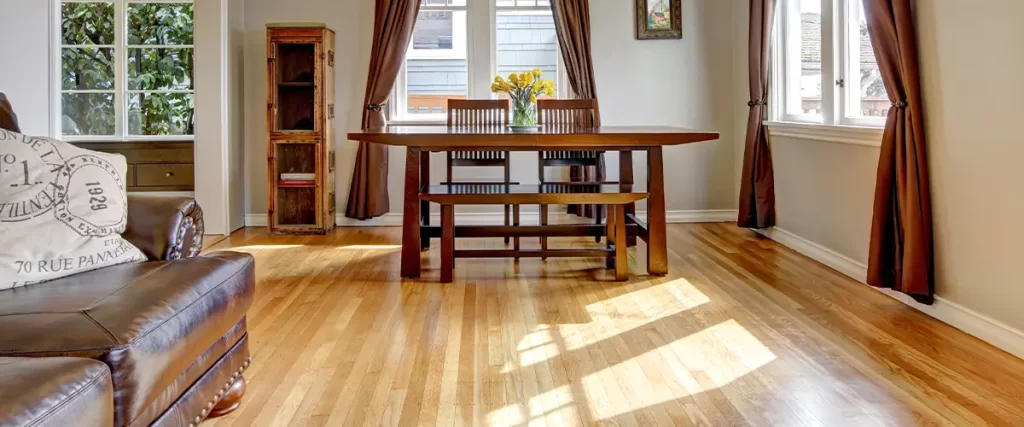
Why Eco-Friendly Flooring is Important for Omaha Homeowners
Omaha’s weather can be harsh — from the humid summers to the cold, snowy winters. Because of this, it’s essential to choose flooring that can handle fluctuations in temperature and moisture while also being kind to the environment.
Eco-friendly flooring materials not only support sustainability efforts but also contribute to improved indoor air quality, a significant concern given the sometimes extreme seasonal shifts and air quality challenges in the area.
In addition, Omaha is a city that values sustainability, with increasing awareness of energy-efficient living and eco-conscious home improvements. Choosing environmentally friendly materials is part of a growing trend to reduce carbon footprints and adopt green practices that benefit both the home and the planet.
Top Eco-Friendly Flooring Options
There are numerous sustainable flooring choices available today that offer durability, style, and eco-friendliness. Here are the best eco-friendly flooring options to consider for your next project:
1. Bamboo Flooring
Bamboo is one of the fastest-growing plants on Earth, making it an incredibly sustainable option for flooring. It’s incredibly durable, resistant to moisture, and easy to maintain. It’s also naturally antimicrobial, which makes it an excellent choice for families with allergies or pets.
Pros:
- Sustainable: Bamboo can grow in just 3 to 5 years, much faster than hardwood trees.
- Durable: Bamboo flooring is strong, similar in hardness to oak, and resistant to wear and tear.
- Stylish: Bamboo flooring is sleek and modern, available in various finishes to suit any style.
Cons:
- Humidity Sensitivity: Bamboo can expand or contract in humid environments, so be cautious in basements or bathrooms unless sealed properly.
- Quality Variation: Some lower-quality bamboo flooring may not be as durable as higher-end options, so make sure to invest in a quality product.
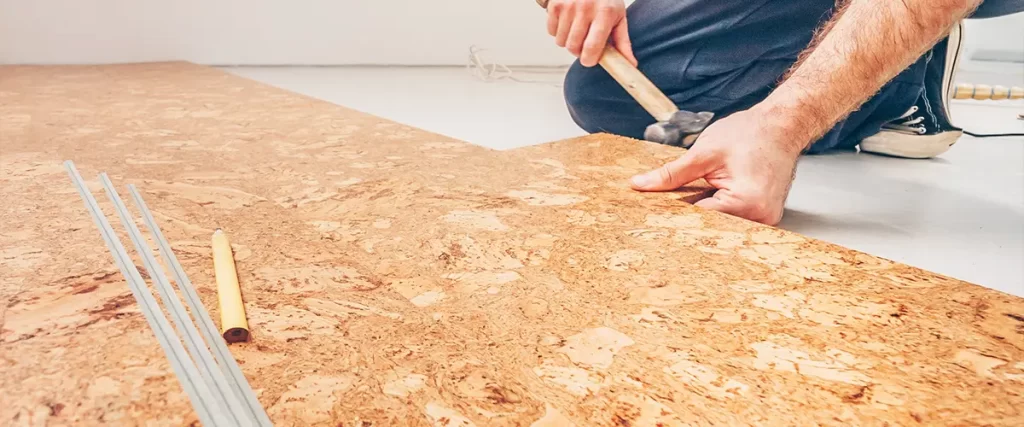
2. Cork Flooring
Cork is another renewable flooring option that is both eco-friendly and comfortable. It’s made from the bark of cork oak trees, which regenerate every 9 to 10 years. Cork has natural insulating properties, helping to reduce heating and cooling costs — perfect for Omaha’s fluctuating climate.
Pros:
- Eco-Friendly: Cork is harvested sustainably and can be recycled at the end of its life.
- Comfortable: Cork is soft underfoot, which makes it ideal for bedrooms and living rooms.
- Natural Insulator: Its natural insulation helps reduce noise and improves energy efficiency.
Cons:
- Moisture Sensitivity: Cork can absorb moisture, making it less ideal for areas like bathrooms or kitchens unless sealed correctly.
- Maintenance: Regular sealing is needed to maintain its appearance and prevent scratches.
3. Reclaimed Wood Flooring
If you love the natural beauty of wood floors but want to minimize your environmental impact, reclaimed wood is a fantastic option. This material is sourced from old barns, factories, and other structures, giving new life to wood that would otherwise go to waste. Reclaimed wood offers unique character and charm, making each plank one-of-a-kind.
Pros:
- Sustainable: Reclaimed wood is recycled and repurposed, which reduces the demand for newly cut trees.
- Aesthetic Appeal: Reclaimed wood often features unique markings, grains, and imperfections that give it character and warmth.
- Durable: Many reclaimed wood floors are extremely strong due to their age and original use.
Cons:
- Expensive: Reclaimed wood can be more expensive due to the labor involved in salvaging and preparing it.
- Installation Complexity: Installation can be more difficult because reclaimed wood may require extra preparation and treatment.
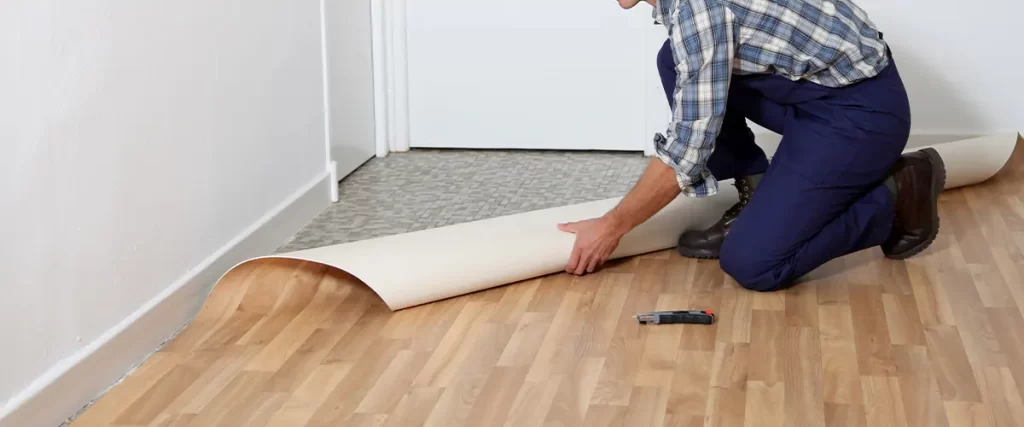
4. Linoleum Flooring
Linoleum is made from natural materials like linseed oil, cork dust, and wood flour. It’s biodegradable, durable, and comes in various colors and patterns. It’s perfect for high-traffic areas like kitchens and hallways.
Pros:
- Natural Ingredients: Made from renewable resources, linoleum is an eco-friendly option that’s free from harmful chemicals.
- Durability: Linoleum is highly durable and resistant to scratches, scuffs, and staining.
- Low Maintenance: This flooring option is easy to clean and maintain.
Cons:
- Moisture Sensitivity: Like cork, linoleum can absorb moisture, which may cause expansion or warping over time.
- Softness: It can be prone to dents or marks from heavy furniture or sharp objects.
5. Recycled Tile Flooring
Recycled tiles, made from reclaimed glass, ceramics, or even porcelain, are a highly sustainable flooring option. By repurposing waste materials, these tiles help divert waste from landfills. Plus, they are often highly durable and come in a wide variety of colors and designs.
Pros:
- Sustainable: Recycled tiles contribute to the reduction of waste in landfills and require fewer raw materials to produce.
- Durability: They are resistant to water, stains, and wear, making them ideal for kitchens and bathrooms.
- Aesthetic Flexibility: Recycled tiles come in various colors, shapes, and finishes, so you can create a custom look.
Cons:
- Cost: Recycled tiles can be more expensive than standard ceramic or porcelain tiles.
- Installation Complexity: They may require professional installation due to the variety of materials involved.
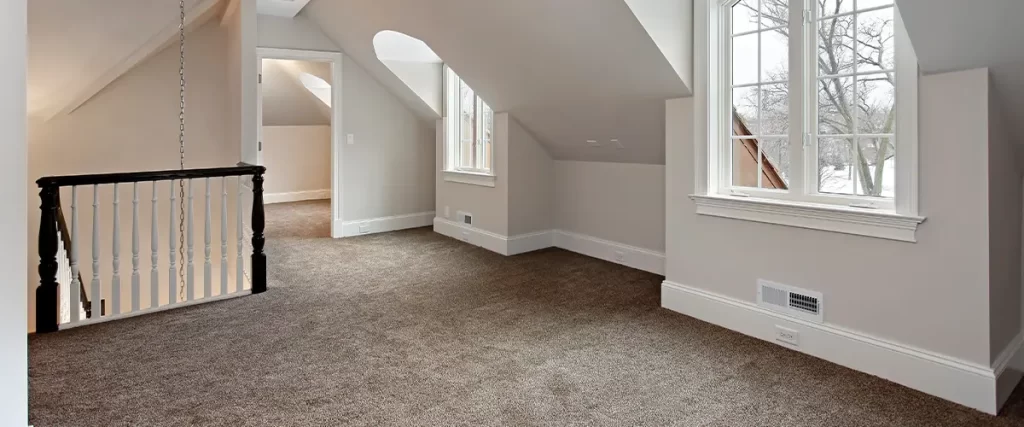
6. Carpet Made from Recycled Materials
Traditional carpet manufacturing can use significant amounts of non-renewable resources, but many modern carpets are made from recycled materials, such as plastic bottles or discarded fishing nets. These carpets are not only environmentally friendly but also often feature antimicrobial and stain-resistant properties.
Pros:
- Recycled Materials: Made from recycled plastic or other waste, this carpet reduces landfill waste.
- Comfort: Provides a soft, comfortable surface for living rooms and bedrooms.
- Variety of Styles: Available in a range of colors, textures, and designs to fit various home styles.
Cons:
- Durability: While durable, some recycled carpets may wear down faster than other eco-friendly flooring options.
- Off-Gassing: Some carpets may emit VOCs (volatile organic compounds) when new, so it’s essential to choose low-VOC options.
Best Manufacturers for Eco-Friendly Flooring
If you’re ready to start exploring eco-friendly flooring options for your Omaha home, here are some of the best manufacturers to consider:
- Shaw Floors: Shaw Floors offers a range of sustainable flooring options, including carpet made from recycled materials and eco-friendly hardwoods.
- Mohawk Industries: Mohawk is known for their sustainable carpets, including options made from recycled plastic bottles and sustainable wood floors.
- Armstrong Flooring: Armstrong specializes in eco-friendly vinyl, linoleum, and recycled tile options that offer durability while reducing environmental impact.
- Cali Bamboo: Cali Bamboo is a leading manufacturer of bamboo flooring that is harvested sustainably and features high-quality finishes and materials.
- Forbo Flooring Systems: Forbo offers natural linoleum flooring options that are made from renewable and biodegradable materials, perfect for eco-conscious homeowners.
Frequently Asked Questions
What is the most sustainable flooring option?
Bamboo and cork are among the most sustainable options, as they are renewable, biodegradable, and harvested with minimal environmental impact.
Are eco-friendly flooring materials durable?
Yes, many eco-friendly materials like bamboo, reclaimed wood, and recycled tiles are incredibly durable and long-lasting when properly maintained.
Is eco-friendly flooring more expensive?
It can be, but the long-term benefits, such as reduced maintenance costs and increased home value, often offset the initial investment.
How do I maintain eco-friendly floors?
Regular cleaning, sealing, and protecting your eco-friendly flooring from excessive moisture will help extend its lifespan and maintain its appearance.
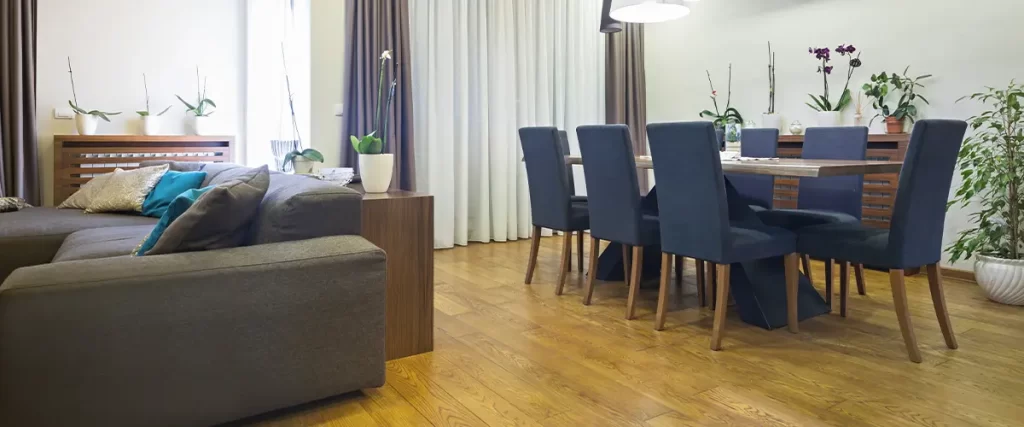
Conclusion: Make the Eco-Friendly Choice for Your Home
Choosing eco-friendly flooring for your Omaha home doesn’t have to be a difficult decision. With sustainable options like bamboo, cork, and reclaimed wood, you can create a beautiful and environmentally conscious space that will stand up to the challenges of our local climate.
Ready to explore eco-friendly flooring options for your home? Contact us at (843) 900-4880 for expert advice and installation services.
